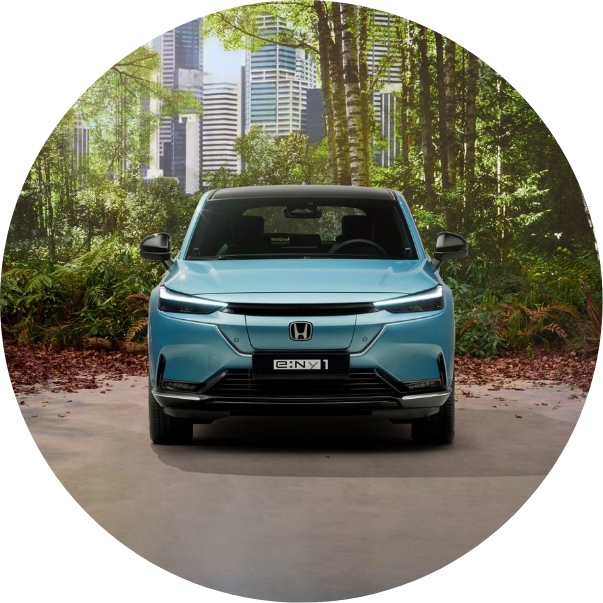

Are you wondering how long it takes to charge an electric car? Discover everything you need to know about charge speeds, public and home charging, and different factors that can affect EV charging times.
Read on to find out more, with this handy guide from Honda.
Electric car charging times can vary, taking anywhere from 30 minutes to 12 hours. Depending on the size of your battery and the charge point output, you will see different results. While slower, charging overnight at home could result in some great savings.
Two of the biggest contributors to significant charge times are having a large car battery and a low-power charge point. Charging from mains power may take longer than any other charge point, as its power output is usually only 3.7kW. This could take a 60kWh battery almost 16 hours to charge.
Using a 7kW home charger could charge the same vehicle in as little as 8 hours from empty, and most homes can easily support this. Depending on your driving habits, you may not be charging from empty every day.
High-powered electric charging points are publicly available to you. These can range from 50kW, all the way to 100+ kW, charging your vehicle in 30+ minutes.
The battery size is one of the most important measures of your EV’s charging time. The larger it is, the longer it will take to charge.
Charging the battery from empty takes longer than recharging it from partially full.
Most manufacturers limit your electric car’s charging speed – regardless of charger, you won’t be able to exceed this value.
Charge points may have charging rate caps – regardless of charger, you won’t be able to exceed value.
The charging time of your electric car’s battery will be slower during colder weather as well as during extremely hot spells.
There’s no catch-all solution for determining charge time to the minute.
With weather, charge rates, battery deterioration, and your own driving habits it’s hard to say how long things will take.
It’s possible to get somewhere close. While generalised, the examples in this E charging time chart should give an idea of your average charge time.
These assume a healthy battery, ideal weather, and charging your battery from 0-100%.

Depending on your lifestyle, you may use one of these options more than the other. While home charging can be convenient, it’s often slower than public charging. However, public charging may be more expensive or require you to sign up for an app to access it.
Public charge points offer fast charging for electric cars, perfect if you need to top up during a long journey. However, they may not be ideal for charging from empty to full, depending on your day. Charge times can vary, based on power. The two most common charge types are:
50 kW – these can reduce EV charging times to less than two hours for even a large battery
150 kW – while rarer, 150 kW charge points will top up a battery from empty in less than an hour
Your electric car charging time at home will often be slower. It is better done overnight for anything more than a quick power top-up. Home charger’s kW power options include:
3.7 kW – on average, these will take 20 to almost 30 hours to charge.
7 kW – are the most recommended home charge points, with EV charging times between 10 and 15 hours on average
22 kW – these are rare, expensive to fit, and require a 3-phase home electricity supply that can support them. They’re mostly seen in Tesla models
Both options can easily top up your vehicle’s charge, and give you significant mileage, in minutes. Depending on the operator, you may have to pay-as-you-charge – potentially via a phone app you’ll need to sign up to. However, you don’t have to pay for all the charge points. It’s worth looking at what your area offers. If you do need to pay, top-up charging may be beneficial.
One of the most convenient ways to charge your vehicle is to do so while parked. That may be overnight, at work, or while at the gym or shopping for groceries. Many car parks offer charge points. The benefits of this include:
Generally, no – top-up charging shouldn’t ruin your EV battery. Most battery management systems have countermeasures for constant fast charging too and most vehicles have innate caps to protect their batteries.
However, in some instances, it may be worth charging to less than 100% to preserve battery health.
While this will depend on your vehicle, an EV can sit for months without charging. Your battery level can also impact the time your vehicle retains its charge, and, contrary to what you may think, a charge of around 50% is ideal.
Your electric car’s run time will depend on a few factors, mostly related to your battery’s size and its condition. Generally, this is determined by range, which is the number of miles your vehicle can run compared to its charge. Older EVs on average will run for 99 miles, though more modern vehicles can range from 248 to 327 miles.
No – though there’s a caveat to this. EVs are energy negative while driving, but regenerative braking can restore some of the lost energy. This makes them more energy efficient but doesn’t constitute self-charging. Think of it more as partial recycling.
On average, electric car batteries last approximately 100,000 miles or roughly 15-20 years. Though, there are reports of EVs lasting for more than 198,000 miles.
An EV is safe to sit in while charging. But if you rely on any electric device for your health, such as a pacemaker, it’s recommended you don’t sit in the vehicle while it’s charging. The electromagnetic fields could interfere with the device’s function. If you’re in doubt about this, seek advice from a medical professional.